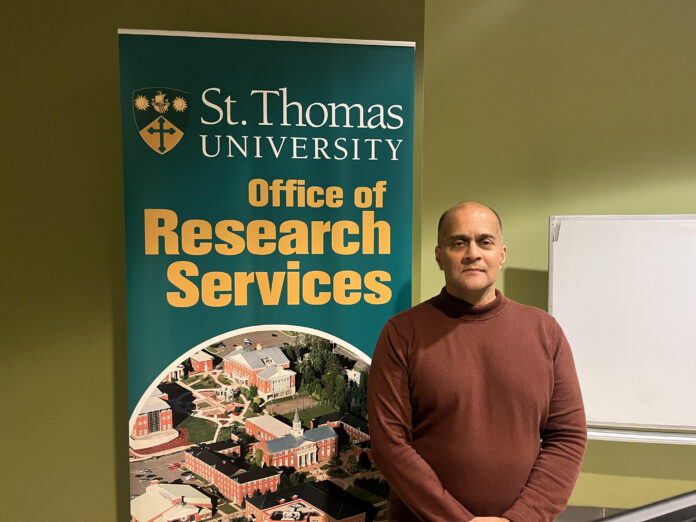
St. Thomas University’s chair of political science Shaun Narine kickstarted a series of three public lectures at STU on Oct. 17. His lecture was titled ‘The Lessons and Tragedies of the War in Gaza.’
Over 40 people were in attendance to hear Narine talk about the events that have conspired since the Oct. 7 Hamas attack on Israel, where around 1200 Israelis were killed and over 200 people were taken hostage.
“I knew that, given the nature of the topic, it would probably attract a lot of attention,” said Narine. “I was very happy with the turnout … we were able to have discussion without there being too much pushback or controversy.”
Narine said that he would’ve liked to have been more challenged by the audience as the crowd largely agreed with his ideas.
According to the United Nations convention on the prevention and punishment of the crime of genocide, genocide is when any one of five acts are performed with intent to destroy, in whole or in part, a national, ethnical, racial or religious group.
“What Israel is doing in Gaza is genocide,” said Narine. “I think this is one of these situations where the evidence is overwhelming.”
Carey Watt is a professor in the history department at STU who is teaching a course this semester on the history of the Middle East.
Watt attended Narine’s lecture and was able to give some further context into the history of the conflict.
“[The Oct. 7 attack] led to this huge shock in Israeli society and for supporters of Israel on a global scale … The single biggest killing loss of Jewish life since the Holocaust,” said Watt.
According to a report from the UN, as of Oct. 1 nearly 54,000 casualties have been reported as direct deaths from violence in Israel, Gaza and the West Bank since the Oct. 7 attacks. Roughly 97 per cent of those recorded deaths were Palestinians.
There were also over 62,000 additional deaths from starvation reported on Oct. 2 of this year.
During the lecture Narine presented additional estimates of indirect deaths caused from this war. The year end estimates for total deaths range from 335,000 to 500,000 casualties depending on the reporting source.
Narine made a point in the introduction of his lecture that the modern-day conflict is connected to the long history of antisemitism in the Western world and the Holocaust.
The dehumanization of Palestinian citizens over this time has played a large role in Palestine being “an appendage of this story,” according to Narine.
“The humanity of the Palestinians is not a secondary consideration. For decades, the Palestinians have been erased in Western society. They have been silenced, they have been unable to tell their history, they have been unable to share their pain, they have been shut out of the media, they have been completely dehumanized,” said Narine.
According to Watt, this conflict reached a new level of concern with the emergence of the Zionist movement in the 1890s. Since the establishment of the State of Israel in 1948, Israeli settlements and colonists have occupied Palestinian territories with over 100 settlements and over 700,000 people, mostly in Gaza and the West Bank.
“It’s led to more Palestinian frustration, grievances, more tensions, more violence, more wars,” said Watt.
Watt believes that this is what led to the conflict spreading into neighboring nations such as Syria and Lebanon, saying that it all goes back to the beginnings of Jewish immigration into Palestine.
